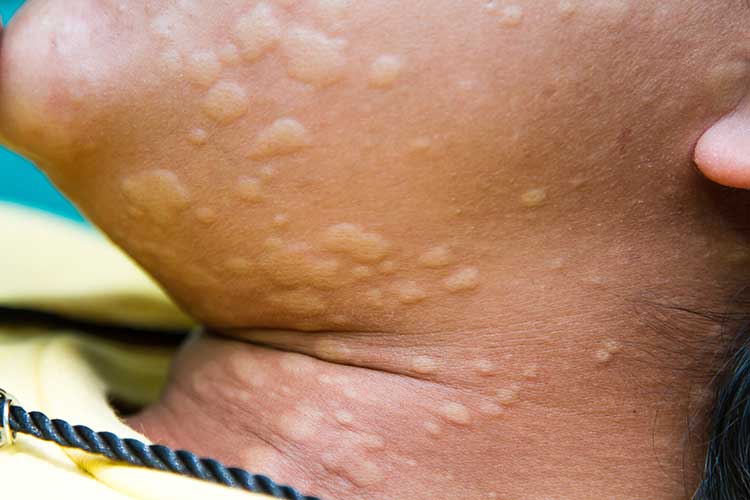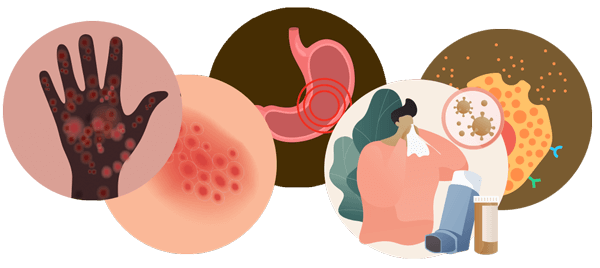Hives
An estimated 20 percent of people will have hives at some point in their lives.
Chronic or recurrent hives can affect your quality of life. Their appearance may affect your social life. The itching can not only be annoying, but also cause sleep issues. It is normal to feel frustrated. This is especially true if the cause of your hives is unknown.
What are hives?
Hives (or urticaria) are a type of skin reaction. Hives are raised bumps or welts that are often red and itchy. Hives are quite common, and anyone can get them.
If you are experiencing hives along with other signs of a serious allergic reaction known as anaphylaxis, use your epinephrine and seek immediate medical care.



What do hives look like?
Hives often appear as red itchy bumps or an itchy rash and will feel raised when touched. When pressed on, the center of the hive will turn white. While typically red, the redness can be harder to see on darker skin.
Hives come in various shapes and sizes. Individual hives can be as small as one millimeter or as large as 6 to 8 inches in diameter. Someone can have a single hive or a few hives in a single location on the body. This is known as localized hives. Or someone can have severe hives that cover several areas of the body or the entire body.
How long do hives last?
A person can develop acute hives (or acute urticaria) or chronic hives. Acute hives typically last from a few days to 1-2 weeks. However, some people develop hives that can last up to six weeks.
If hives last more than six weeks, your doctor may diagnose your hives as a case of chronic urticaria.
Are hives contagious?
Hives themselves are not contagious — however what is causing the hives may be contagious. For example, if your hives are caused by an infection such as strep throat or COVID-19, the infection is contagious and can spread to other people.
Do hives itch?
For many people who develop hives, itch is a big concern. It can feel like an unending cycle of itching and scratching, and then itching and scratching again as symptoms worsen. It can affect quality of life and impact sleep, especially in children. Talk with your doctor about treatment options to help decrease the severity of itching.


Do you have a history of hives, GI upset and severe allergic reactions (anaphylaxis)? If so, find out more about mast cell disease. ➤
Are hives serious?
Acute hives are often not serious and will go away after treatment. Acute hives along with other signs of a severe allergic reaction are known as anaphylaxis.
Anaphylaxis is a life-threatening allergic reaction. Symptoms may include hives along with:
- breathing difficulties
- swelling of the mouth or tongue
- weakness
- fainting
- vomiting
Anaphylaxis is a medical emergency. The first line of treatment for anaphylaxis is epinephrine. Anyone experiencing an anaphylactic reaction needs to administer epinephrine and seek emergency care at a hospital.
Here are a few options if you can’t afford the cost of your epinephrine medication.
What causes or triggers hives?
While many people think of hives as part of an acute allergic reaction, they can occur for other reasons. Infections may be responsible for as many as 60% of hives cases. But there are also common triggers for hives including:
- Allergic reactions to:
- Foods
- Certain medications
- Plants (such as poison ivy, poison oak)
- Insect bites or stings
- Animal dander or saliva
- Latex
- Pollen
- Viral or bacterial infections (such as strep throat or even COVID-19)
- Autoimmune diseases
- Environmental or physical stimuli (temperature, water, sunlight, physical pressure)
- Exercise
- Unknown causes (also known as idiopathic urticaria)
- Alcohol
There are different types of chronic hives, including hives with unknown triggers.
Can stress cause hives?
Stress does not cause hives, but it can lead to or worsen symptoms. It’s believed psychological factors such as stress play a role in about 50 percent of cases of hives. If stress is playing a role in your hives, you may benefit from working with a counselor or other mental health professional to help manage your stress.
Can pregnancy cause hives?
Pregnancy does not cause hives specifically. However, hormonal changes during pregnancy may play a role in women developing hives during pregnancy.
What autoimmune diseases cause hives?
In patients with chronic hives (hives lasting longer than 6 weeks), about 21% had an autoimmune disease. Thyroid disease, rheumatoid arthritis and antiphospholipid antibody syndrome are the three main autoimmune conditions found in people with chronic hives.
What causes hives in children?
The most common cause of hives in children is an infection, such as viruses or urinary tract infections. Viral infections cause more than 80 percent of cases of hives in children. Food allergy and medications can also cause hives.

How to diagnose hives?
Your doctor will perform a physical exam and look at your skin to confirm that your skin rash is really hives. Your doctor may also want to run some tests, such as a blood test or skin prick test. These will help identify if there is an underlying problem.
Doctors will ask a lot of questions to explore possible triggers and determine the exact cause of hives. Have you eaten a new food? Started a new medication? Has there been a recent infection? Is there anything upsetting your body system that suggests an autoimmune disease? The history of symptoms is very important in figuring out what is causing hives.
If there is no obvious trigger or the trigger is unknown, this is called idiopathic urticaria.

Do you have hives that come and go, or hives that have lasted more than 6 weeks? If so find out more about Chronic Urticaria. ➤
How do I manage hives?
Beyond medications, here are some strategies to consider that can help you prevent hives from developing or provide relief.
- Avoid known triggers, including foods.
- Wear loose-fitting, light clothing. Don’t wear materials such as wool, which could irritate the skin.
- Avoid scented soaps and laundry detergents.
- Soothe the affected skin with a cool wet cloth, lotion or anti-itch cream.
- Cover itchy areas with bandages to avoid scratching them.
- If you must scratch, try pressing on the itchy area or stroking it using the top side of the hand instead of fingernails.
- Drink water often. Hydration can help the skin.
Are hives a symptom of COVID-19?
A recent study from Spain found hives in 19% of people with COVID-19. So hives do appear to be one of the many symptoms of COVID-19.
How to get rid of (or treat) hives?
One of the best ways to get rid of hives is to identify what causes the symptoms and then work to avoid those triggers. If a avoiding the trigger is not possible, the trigger is not known, or symptom relief is needed, the first line of treatment is an antihistamine. If you have hives, it’s also recommended you avoid aspirin, non-steroidal anti-inflammatories (NSAIDs), alcohol and tight clothing, as these can worsen symptoms.
While antihistamines are the first line of treatment, the American Academy of Dermatology has outlined other treatment options for hives symptoms.

Epinephrine
Epinephrine is the first-line treatment for hives associated with anaphylaxis.
Antihistamines
Antihistamines block the production of histamine. They are intended to help ease symptoms of itch and swelling. They do not get rid of hives permanently.
Can Benadryl help with hives?
For years, doctors prescribed a class of antihistamines called first-generation H-antihistamines to patients with hives. The most commonly known first-generation H-antihistamine is Benadryl. Benadryl is also known as diphenhydramine. First-generation antihistamines tend to have more side effects, such as drowsiness.
Doctors now prefer to prescribe second-generation H-antihistamines because they have fewer side effects. Some of the most common second-generation H-antihistamines include cetirizine (Zyrtec), loratadine (Claritin), desloratadine (Clarinex), fexofenadine (Allegra) and levocetirizine (Xyzal).
Corticosteroids
For severe hives, doctors may prescribe a short course of oral corticosteroids. Corticosteroids, such as prednisone, help reduce swelling, itching and inflammation. If taken long-term, they can cause serious side effects, so follow your doctor’s prescription instructions.
Milder cases of hives can be treated with topical corticosteroids on the affected areas.
Omalizumab
Omalizumab (Xolair®) is used to treat chronic hives (chronic urticaria). It is an injectable biologic medication given once per month. Omalizumab is sometimes used when treatment with antihistamines has failed.
Itch Creams
Topical creams or lotions containing menthol may provide temporary relief of symptoms.
Light Therapy
Light therapy, known as phototherapy, may be prescribed by your doctor if treatment with antihistamines fails. Light therapy often requires therapy several times a week for the few months at a treatment center.
Other Treatment Options
For hives that fail to respond to traditional treatment, it is important to work closely with your doctor to discuss treatment options. There are medications that work by reducing your body’s immune response. This treatment should ideally be supervised by a doctor with a specialty in treating hives.
Are there other conditions that can look like or complicate allergies
There are other types of conditions that can mimic allergies, but are different than an IgE-mediated allergy. The symptoms, diagnosis and treatment can vary depending upon the condition. Here are some of them.
Food-related conditions that can have symptoms similar to food allergies include:
Visit Our Other Pages for More Allergy Information, Webinars, Posters, Infographics, and more!
Assistance Programs for Medications
Allergy Online Store
Allergy Posters
Allergy Webinars
Allergy News
Allergy Facts
Allergy Dictionary
Allergy Medication & Treatment
See Related Pages
- Symptoms of Allergies
- Hives
- Allergy Diagnosis and Testing
- How are Allergies Treated?
- Nasal Allergy, Rhinitis and Allergic Rhinitis
- What if I Can’t Afford My Allergy Medications?
- Pregnancy and Allergies
- Pollen Allergy
- Eye Allergies – Allergic Conjunctivitis
- Mold Allergy
- Allergies to Dogs – Cats – Pets
- Allergy to Dust Mites
- Cockroach and Mice Allergy
- Insect Allergy
- Drug Allergy
- Complete Guide to Latex Allergy
- Allergy Statistics in the US
- Allergy Dictionary
- Allergy Webinars
Reviewed by:
Purvi Parikh, MD, FACAAI is an adult and pediatric allergist and immunologist at Allergy and Asthma Associates of Murray Hill in New York City. She is on faculty as Clinical Assistant Professor in both departments of Medicine and Pediatrics at New York University School of Medicine.
